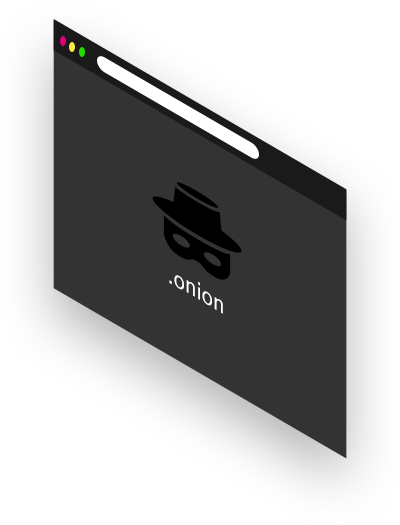Dive into
the darknet
A beginner’s diving course in six
stages. And why even you should
surf in the darknet.
Surfing the darknet can be more secure than surfing the normal internet
- How dangerous actually is this "dive" into the darknet? Is it only shady characters and criminals who lurk there? The answer is surprising: surfing the darknet can occasionally be safer than surfing the "normal" Internet, provided that you heed the tips below. How so? Let's take the plunge and go on a small expedition into the darknet!
Using the Tor browser, you can visit normal websites of the so called "Surface Web" as well. The access then happens anonymously.
In the entire internet, there are about 6000 nodes of the Tor network. Only the connection behind the last node in unencrypted.
For using the darknet, or simply for browsing anonymously, you can use the free Tor browser.



















1Am I already there?
- Would you plunge into the sea without an oxygen tank? Of course not. One suitable example of an "oxygen tank" for the darknet is the Tor browser. This you can download for free. The Tor browser is operated just like your normal browser. Enter the web address you're searching for (Google's, for example) in the URL bar as you normally would.
2Playing telephone
- What happens then is rather brilliant. Imagine the darknet as you would playing telephone: in contrast to a normal browser, the Tor sends your request via several "middlemen" to the Google web server; via three middlemen to be precise. The brilliant thing about the concept is that your search engine doesn't know who exactly is searching for "Tina Turner music videos" as the request travels via the telephone game route. Your search engine only recognizes the third middleman and the search term. Nevertheless, your search engine has the ability to send the search results back to you - likewise via the "telephone game" route obviously. Your biggest advantage on the darknet is that you are to a large extent surfing anonymously – at least if you are following the tips below. Your search engine doesn't know where you are located, nor who sits right at the other end of the tunnel with an interest in Tina Turner videos. Why this is of inestimable value for you, by the way, we share with you in our article on the transparent user. The Tor browser is open source by the way. Anyone can thus view the source code and review how it functions. Among other reasons, that's why many users trust the program as a truly anonymous service with no strings attached.
Websites in the darknet can be recognized by their ending .onion. They can only be open with the Tor browser. Their also called "hidden services". Some of the contain illegal things.













3On the Onion’s secret service
- This way you can surf anonymously on the normal internet. It goes one stage further in the darknet. When a domain in the URL bar ends with ".onion" instead of ".com," that means you've ended up in the darknet. In the darknet, such websites are referred to as "hidden services." These hidden websites cannot be found via normal search engines. You can find lists of hidden services and their addresses via a normal internet search. When doing so, it could get a bit dicey if a page ends with ".onion". Still, there's a lot more to be found there than offerings by criminals. Even the "New York Times" has a hidden service version of its website. You can reach it using the Tor browser via the domain https://www.nytimes3xbfgragh.onion/.


Cache me if you can The world described in Orwell's novel 1984 is already possible today; the software developer Ben is well aware of that. In times of privacy scandals like at Facebook, he doesn't trust the law with protecting his privay. Instead, he takes appropriate measures himself. And that's really easy.
4Is the darknet illegal?
- The clear answer is no. When you install the Tor browser and use it to surf anonymously on the internet, you are obviously not committing a crime. In particular, journalists and whistleblowers in countries with political persecution utilize the darknet to do research and communicate undetected. Just as in normal life, "illegal" only applies to those conducting criminal activities.
5How anonymous
am I really?
- It is reported that government agencies such as the BND (Federal Intelligence Service) and the NSA are working on a technology that would enable them to remove anonymity on the darknet. And even without special technology, there are ways and means to unveil your IP address and use it to identify you. These however are so complicated, computation-intensive and time-consuming that it's not worthwhile to use it to identify normal internet users. For normal surfing on the internet, it holds true that Tor offers excellent services when it comes to keeping the internet giants’ data suckers in the dark.
6Who invented it?
- Originally, Tor was created by the United States military. Secret service agents could thus use it to conceal their activities on the internet. Its greatest backer is still the U.S. government, which aims to hinder "internet repression, surveillance and monitoring" via the darknet. The concept of "playing telephone" has quickly gained many enthusiasts. Even the German hacker association Chaos Computer Club utilizes it to surf anonymously.
The darknet is the internet as it really should be. An internet without censorship and surveillance, with all its advantages and disadvantages. Linus Neumann, Spokesman at CCC
- "The darknet is the internet as it really should be. An internet without censorship and surveillance, with all its advantages and disadvantages," says Linus Neumann, spokesperson for the Chaos Computer Club.
While we're on the topic of "surveillance": For anyone who believes that they
remain anonymous as they surf away via an open incognito window in Chrome, Safari and Internet Explorer, we have some bad news for them. The incognito tab only partially protects your privacy. An incognito window only serves the purpose of preventing other users who surf on your computer - let's say your family - from seeing which pages you've visited. Read our eight tips on how you can protect your online privacy.